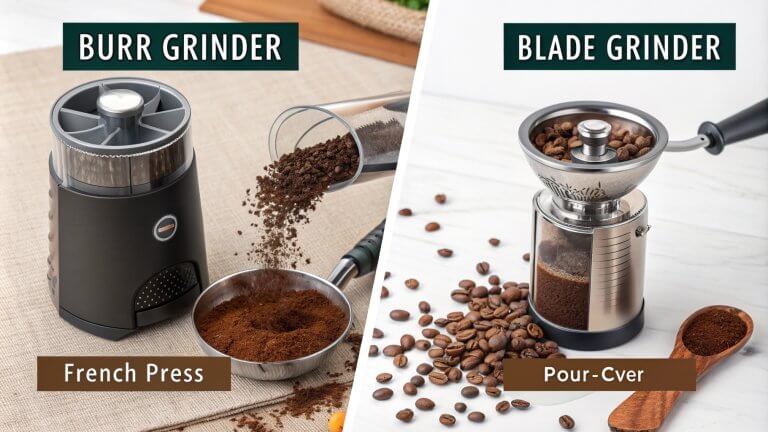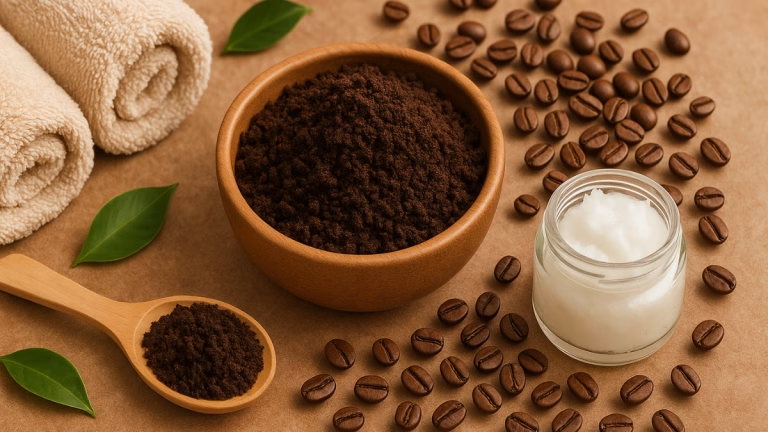
Hey there, coffee lover! There’s just something special about black coffee, isn’t there? It’s that pure, simple joy of sipping a brew that hasn’t been masked by milk, sugar, or anything else. When it comes to what beans are for black coffee, the options can seem endless, but don’t worry, you’re in expert hands. As a seasoned coffee enthusiast and expert, I’m here to help you navigate the world of coffee beans and find the perfect match for your taste.
This guide will explore the best bean types that allow you to experience that pure coffee flavor in black coffee. We’ll primarily focus on Arabica and Robusta, the two main types of beans you’ll encounter. We’ll dive into how different roast levels can change the taste and discover how various brewing methods affect your final cup. Plus, we’ll share expert tips to help you brew black coffee like a total pro. The quest for the perfect bean is like finding a hidden gem.
Let’s get brewing!
Arabica vs Robusta: Understanding the Core Bean Types
So, you’re venturing into the world of black coffee? Great! You’ll first want to familiarize yourself with the difference between Arabica and Robusta beans. These are the two main types of coffee beans, and each brings something unique to the table.
Arabica is often seen as the go-to choice for black coffee lovers. Why? It’s known for its smoother, more aromatic taste and is generally less bitter than Robusta. Arabica beans boast a complex flavor profile, with hints of chocolate, nuts, caramel, and even fruits. The variety of flavors in Arabica beans is sure to excite your taste buds. In fact, because of its superior taste and aroma, Arabica accounts for about 60% of the world’s coffee production.
On the other hand, Robusta beans pack a bold, strong, and often bitter punch. They also have a higher caffeine content, which can be a big draw for those needing an extra kick. You’ll usually find Robusta in espresso blends because it enhances the crema and adds extra caffeine. Some may find Robusta beans to have an overwhelming bitterness.
Here’s a quick side-by-side comparison:
- Flavor Profile: Arabica (smooth, aromatic, complex) vs. Robusta (bold, pungent, bitter)
- Acidity: Arabica (higher) vs. Robusta (lower)
- Caffeine Content: Arabica (lower 0.8-1.5%) vs. Robusta (higher 1.7-4%)
Which one is right for you? The beauty of coffee is that it’s all about personal preference. If you prefer a smoother, more aromatic cup with complex flavors, go for Arabica. But if you’re after a bold, strong, and highly caffeinated coffee, Robusta might be your best bet. Keep in mind that many black coffee blends combine Arabica and Robusta to get a balance of both smoothness and intensity. The power is in your hands to choose the coffee that best suits your taste, empowering you to create your perfect cup.
How Roast Level Impacts Flavor Profiles for Black Coffee
The secret to a fantastic cup of black coffee often lies in the roast. Roasting is what transforms those unassuming green coffee beans into the aromatic, flavorful wonders we know and love. The heat brings out their aroma, taste, and color.
- Light Roasts: Delicate and Bright.
These beans are light brown with no oil on the surface. You’ll notice bright, citrusy, floral, or fruity notes, a higher acidity, and more caffeine. If you enjoy a bright, acidic cup, use a light roast, ideal for pour-over and drip brewing. - Medium Roasts: Balanced and Versatile
These medium brown roasts with a bit of oil offer a balanced flavor. Expect notes of caramel, nuts, and chocolate, moderate acidity, and a good caffeine kick. They’re versatile and great for drip, pour-over, and French press. - Dark Roasts: Bold and Smoky
These beans are dark brown (almost black) and oily. They deliver bold, smoky, and sometimes bitter flavors with lower acidity and less caffeine. Dark roasts are best if you crave a bold, full-bodied cup and work well for espresso, French press, and cold brew.
Choosing the proper roast is key, as it significantly impacts the taste of your black coffee. So, don’t be afraid to experiment to find what suits your preferences. This adventurous spirit and open-mindedness will lead you to discover new and exciting flavors in your cup of black coffee.
Single Origin vs Blends
When diving into the world of black coffee, you’ll quickly encounter the terms “single-origin” and “blend.” Understanding the difference can unlock a whole new level of appreciation for your daily cup.
Single-origin coffees come from one specific region or even a single farm. These are ideal for those exploring distinct flavor notes unique to their origin. For example, you might find that Ethiopian beans offer bright, fruity, and floral notes, while Sumatran beans are known for their earthy, rich, and full-bodied profiles. These unique characteristics reflect the “terroir” of the growing region, similar to wine.
Blends, on the other hand, are all about creating balance and consistency. Roasters carefully combine different beans to achieve a harmonious combination of sweetness, acidity, and body.
Ultimately, the best choice for black coffee comes down to personal preference. Blends are great if you want a consistent flavor every time, while single-origin coffees allow you to explore the wide range of flavors different regions offer.
:
Brewing Methods, Black Coffee, and Flavor
Another crucial factor in brewing black coffee is the quality of water. Different brewing methods play a key role in determining the taste of your black coffee. Each method extracts flavors and aromas from the coffee beans in a unique way, but the water you use can significantly affect the final taste and smell of your coffee. Clean, filtered water ensures the best possible flavor in your cup.
- Pour-Over Method: This method allows for great control over the extraction process, resulting in a clean and bright cup that highlights the subtle nuances of the beans.
- French Press Method: This immersion method produces a full-bodied cup with a rich and robust flavor.
- Drip Coffee Maker: A versatile and convenient choice, drip coffee makers produce a balanced cup with a medium body.
- Cold Brew Method: This method uses a long steeping time and produces a smooth, low-acid concentrate. It’s perfect for dark roasts.
Choosing the correct brewing method is essential for getting the most out of your black coffee. For instance, the pour-over method is often recommended for those seeking a clean and bright cup that highlights the subtle flavors of the beans.
Recommended Coffee Beans for Black Coffee: Top Picks
Here are some recommended coffee beans that are good choices for brewing black coffee:
- Ethiopian Yirgacheffe: Ethiopia’s highly regarded Arabica coffee is known for its bright acidity, floral aroma, and complex flavor profile. It is recommended as a top pick for a colorful and fruity experience. A light to medium roast is suggested to best experience its jasmine, bergamot, and lemon flavor notes. Due to notes of caramel and slight tangerine bitterness, it is a good option for beginners.
- Sumatra Mandheling: This Arabica coffee from Indonesia has a whole body, low acidity, and an earthy flavor. A medium-dark to dark roast is recommended to highlight its spice and cedar flavor notes.
- US Roast Classic House Blend: This is a balanced blend of Arabica beans from various origins. It is a versatile medium roast with a smooth flavor and chocolate, nuts, and caramel notes. It offers a harmonious combination of sweetness, acidity, and body.
- Lifeboost Medium Roast Coffee: This is an exceptional choice for black coffee drinkers. The medium roast creates a perfect balance of flavors, making it smooth and enjoyable to drink without bitterness, with citrus and caramel notes.
- Volcanica Ethiopian Yirgacheffe: This premium coffee is perfect for those who enjoy black coffee. This bean is special due to its distinctive fruity and floral notes, with hints of citrus, caramel, and even hazelnut.
Brewing Black Coffee Like a Pro: Expert Tips and Best Practices
- Use Freshly Roasted Beans: For the best flavor, use beans at their peak within a few weeks of roasting. Buy from roasters who provide roast dates. Purchase small quantities and store them in an airtight container in a cool, dark place.
- Grind Just Before Brewing: Maximize flavor and aroma by grinding right before brewing. A burr grinder is recommended for producing even grounds. The grind size should be appropriate for your brewing method.
- Use the Right Water Temperature: The ideal water temperature is between 200-205°F (93-96°C). To ensure accuracy, use a kettle with a thermometer or bring water to a boil and let it sit for 30-60 seconds before pouring.
- Measure Coffee and Water Accurately: Use the correct coffee-to-water ratio to achieve a balanced and flavorful cup. A general guideline is a 1:16 ratio (20 grams of coffee to 320 grams of water). Use a kitchen scale for accuracy and adjust the ratio based on personal preference.
Tips for a Smoother Cup
Several factors can lead to bitterness in black coffee, including over-extraction, high water temperature, using a too-fine grind, or opting for dark-roasted beans.
To reduce bitterness, consider these tips:
- Use a coarser grind.
- Lower the water temperature (ideally between 200-205°F or 93-96°C).
- Reduce the brew time.
- Choose a lighter roast.
Also, ensure that you are using fresh, high-quality beans.
Good water is also essential. You can use a paper filter.
Health Benefits of Drinking Black Coffee
According to the sources, black coffee offers potential health benefits beyond its appealing taste and invigorating properties. It’s not just about the rich, bold flavor; there are compounds within black coffee that contribute positively to one’s well-being.
Black coffee contains antioxidants and other beneficial compounds. These compounds often protect the body from damage caused by free radicals.
Furthermore, the sources mention potential benefits like improved cognitive function. This aligns with the common experience of feeling more alert and focused after drinking coffee.
Another potential advantage highlighted is a reduced risk of certain diseases. While the sources don’t specify which diseases, they indicate a link between black coffee consumption and disease prevention.
It’s also noted that moderate consumption is generally safe and beneficial. This suggests that enjoying black coffee in moderation is key to potentially reaping these health advantages.
Conclusion
In summary, crafting the perfect cup of black coffee is a journey of discovery. Knowing the nuances between Arabica and Robusta beans, understanding roast levels, and mastering brewing techniques are all essential for unlocking a world of flavor. Whether it’s the bright notes of an Ethiopian Yirgacheffe or the bold taste of a Sumatra Mandheling, the ideal bean is waiting to be discovered.
Experiment with different beans and brewing methods to discover personal preferences. The best beans for black coffee are ultimately those that bring the most joy and satisfaction to your palate.






